If you don’t own a guinea pig and you plan on getting one, you’ve probably heard about the famous grease gland in guinea pigs. This gland is very important in a guinea pig and from my experience, many owners tend to neglect it.
What is a guinea pig grease gland? A guinea pig grease gland is an opening at the end of their spine. Its main purpose is to mark the territory. After a while, the secreted greasy substance solidifies, creating a visible trail. Thus, it must be cleaned on a regular basis so that the grease does not accumulate. When grease accumulates, it might cause irritation.
In this article, you are going to see what is guinea pig grease gland is, what are the ways to keep it clean, and much more.
Table of Content
Why Do Guinea Pigs Have Grease Glands?
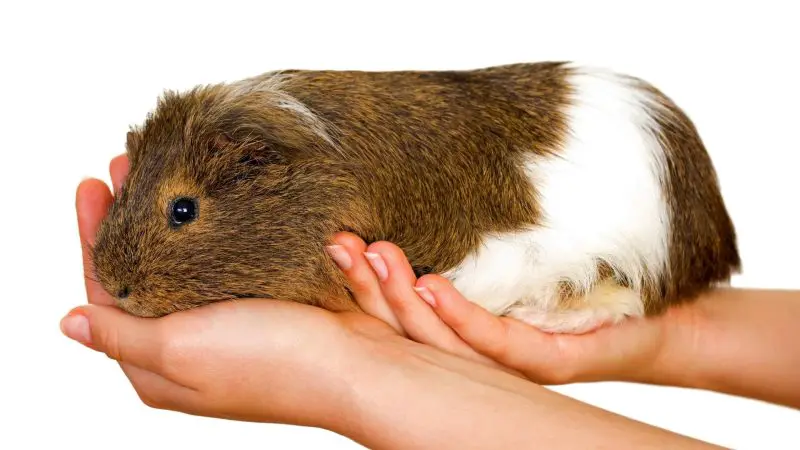
A guinea pig grease gland is an opening located at the end of their spine. The location is exactly at the position of the tail bone. As its name implies, this gland secretes a greasy substance and its function is to mark the territory.
Other guinea pigs can then detect that the territory has been marked by smelling this secrete. That being said, this secretes from the gland has a smell, which will get exacerbated if the gland isn’t cleaned regularly.
The main characteristic of the grease gland is that it isn’t very active or active at all when the guinea pig is young. Heading towards puberty, this gland becomes more and more prominent. As the pig matures, it becomes even more active.
Since the basic function of the gland is marking the territory, science proves that more aggressive and dominant guinea pigs have more active grease glands. A grease gland can become inactive if you neuter your guinea pig.
What Is the Function of the Grease Gland?
A grease gland is a very powerful tool for a guinea pig. The main purpose is to mark the territory. The greasy substance that’s secreted becomes solid after some time, leaving a tangible trail.
Another function of this gland is sexual attraction. The scent from the grease is excellent for sexually attracting male or female pigs. Guinea pigs usually rub their grease gland against a surface, which other guinea pigs can smell and go there.
Do Female Guinea Pigs Have Grease Glands?
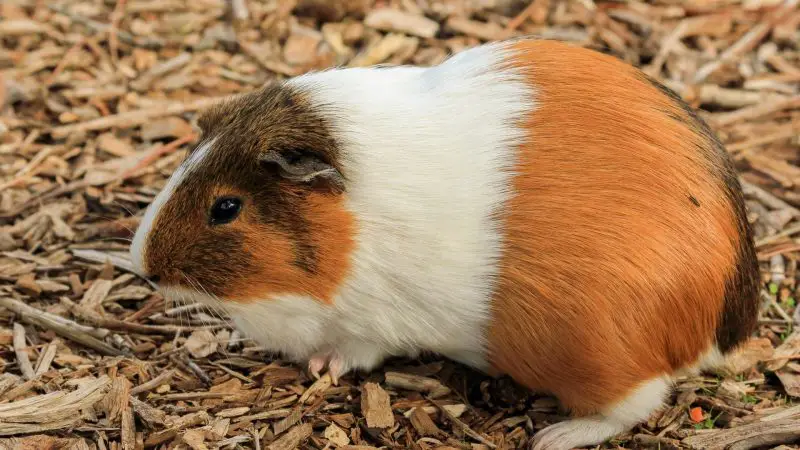
Female guinea pigs do have grease glands, contrary to the typical belief. Their grease glands are the same but they aren’t active as in male guinea pigs. There are some exceptions to this, as some female pigs tend to be very dominant. In this case, a grease gland can be as active as in male guinea pigs, which is a rare case overall.
How to Find the Guinea Pig’s Grease Gland?
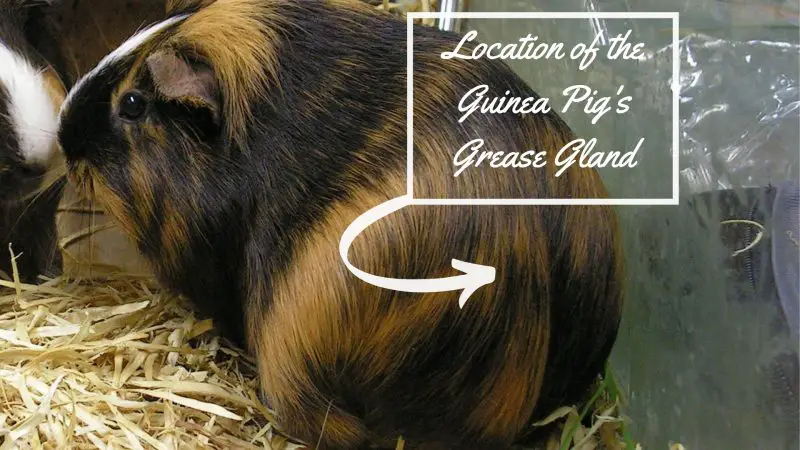
The main thing here is to notice that the gland is completely hidden. Guinea pigs have fur that covers their genitals, meaning that it’s hard to notice. You can, however, begin by looking above the place where the tail should be.
If you don’t succeed, you can use a tangible method. Simply follow the spine with your finger until you reach the back of the body. There, you should be able to feel the tailbone. Just above the tailbone is the location of the grease gland.
If you have a male guinea pig, locating the grease gland should be a walk in the park. During and after puberty, male guinea pigs have very active and prominent grease glands, thus locating it is easy.
As for the female pigs, things can be a bit tougher for the reasons mentioned above. Guinea pigs with long hair make this process a bit easier but only if they have an active grease gland. You should also be able to see the wet fur or simply by touching it, you will feel the wetness of the fur.
As soon as you notice that your guinea pig starts having an active grease gland, it’s time to take care of that!
Reasons Why You Need to Clean the Grease Gland
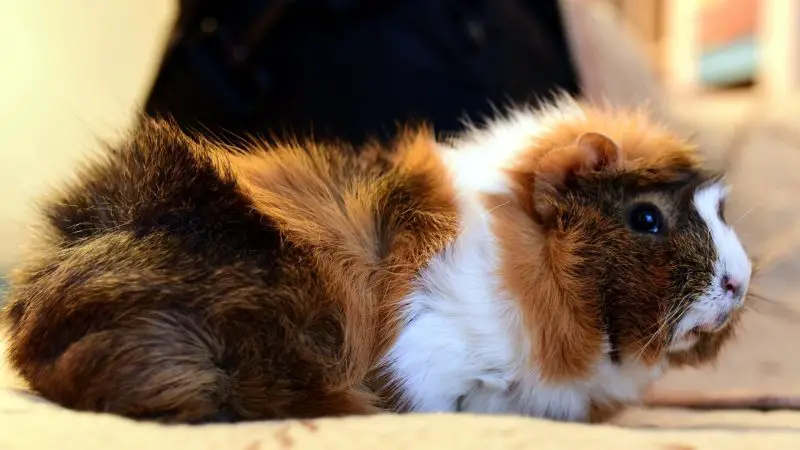
A guinea pig with a very active grease gland requires daily cleaning, so the grease doesn’t build up. If the grease builds up, it can lead to irritation. Your guinea pig can then begin scratching that area or simply refuse to have physical activity and eat.
Remember that guinea pigs are very sensitive animals, so this condition can give them “a punch in the throat”. If this irritation isn’t treated, it can lead to infection of the grease gland, and believe me, you don’t want to witness this!
If for some reason, you find that this gland is infected, it’s important that you visit the vet as soon as possible. This secretes is thick and because of that, it can completely clog your guinea pig’s grease gland. This can be a challenge to treat, even for an experienced vet, so it’s better to keep it clean.
Finally, we have to mention that obnoxious smell, which will immediately tingle your senses. Guinea pig’s grease glands can produce a foul smell from time to time, but only if you don’t do the cleaning regularly.
How Often Should You Clean the Guinea Pig Grease Gland?
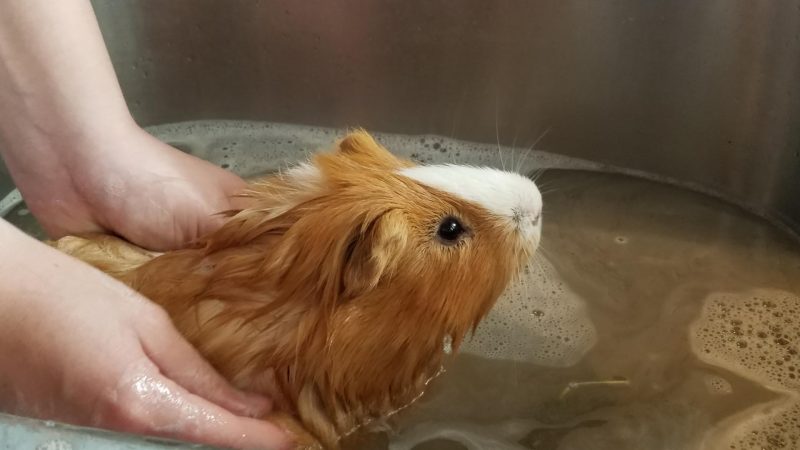
You sometimes need to clean the guinea pig’s grease gland daily. While this was an exaggeration, it can sometimes be the case, depending on its effervescence.
For a guinea pig that’s not that dominant and has a relatively dormant grease gland, the cleaning should occur between once a week to once a month. Once again, it all depends on how much the gland is active. For that reason, you’re here to monitor the pig and do all the necessary stuff.
The same applies to the buildup. Some guinea pigs will have a buildup in a matter of days, while some will in a matter of weeks. This grease is indeed thick but there are slight differences in thickness for every guinea pig.
Even if a guinea pig has a very active grease gland, cleaning it every day may help but in some cases, might not. This can sometimes lead to very dry and rough skin at that place, which makes it irritating for a guinea pig.
If you notice that the grease gland is unusually active, you should visit the vet.
How to Clean the Grease Gland? | Easy to Follow Instructions
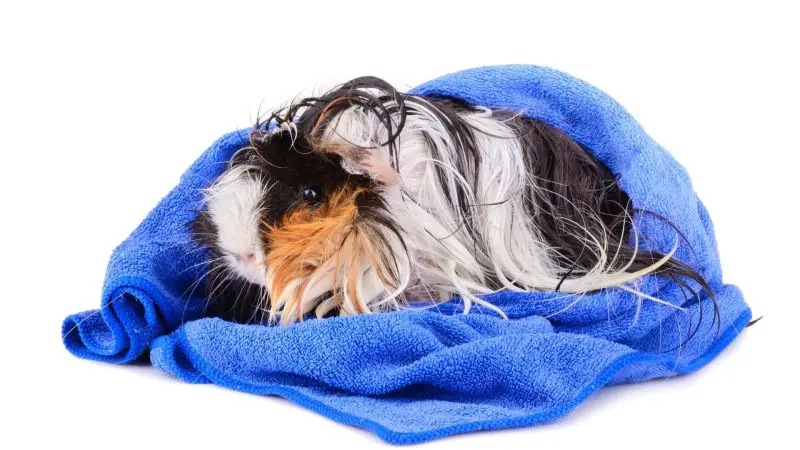
So, how do you clean the grease gland of guinea pigs? Here are the necessary steps:
Step 1: If your guinea pig has very long hair, trimming the hair around the gland is necessary. Again, this depends on the hair itself.
Sometimes it’s necessary, sometimes it’s not. The reason for this is that the grease can form lumps in the hair, making it more difficult to clean, especially for the long-haired guinea pigs.
Step 2: When you’ve completed the first step, the next step is to apply a softening agent. Our recommendation is to apply some coconut or olive oil around that area and then wait for a few hours. This will soften the grease, making it very easy to clean.
You can apply the oil with a soft towel, a soft tissue, or with your hands. If you do it with your hands, make sure to wash them before touching a place this sensitive place.
Step 3: When the oil does its job, you can proceed to a bum bath. Remember, you only need to wash their bum and not the whole body.
Guinea pigs don’t need to be bathed. If you go with regular water, that might not be that effective. You can add some guinea pig shampoo. If you don’t have this you can also use baby shampoo.
Step 4: When you add a cleaning agent, don’t go with a lot of water at first. Use a small splash of water and go for the harder portions first. Apply more water and cleaning agent until you see that it’s clean. After that, splash it with a bit of water.
Step 5: Now that you’ve cleaned the grease, it’s time for a finishing touch. You can use your regular shampoo and wash the bum once again. Some recommend that you bathe them fully, but since guinea pigs aren’t very keen on that, you can skip it unless it’s necessary.
If your pig is dirty and smells, you can bathe it but for a short time. Remember to wash away all the chemicals (cleaning agent) with clean water afterward.
Step 6: For drying, you can use an ordinary soft towel. If you find that the skin around the grease gland is dry and rough, you can use a small splash of coconut oil and put the guinea pig back in the cage.
Summary
The grease gland is an integral part of the guinea pig’s body and its function is very important. It’s used for territory marking and sexually attracting other guinea pigs. We also learned that it’s very important to keep it clean, whether it’s a grease gland in male or female pigs. Remember to always be gentle with your guinea pig and not force things on them. They are sensitive animals and you’ll need to respect them.
